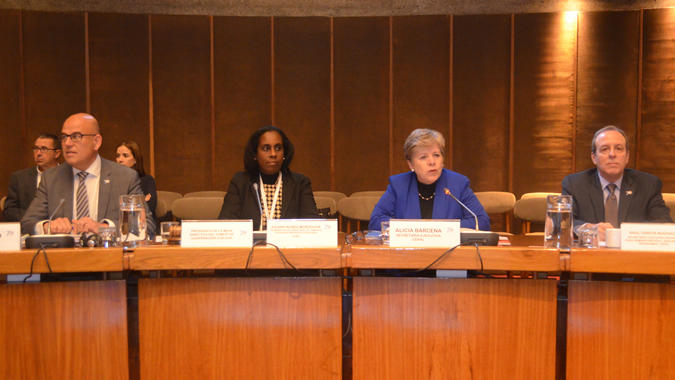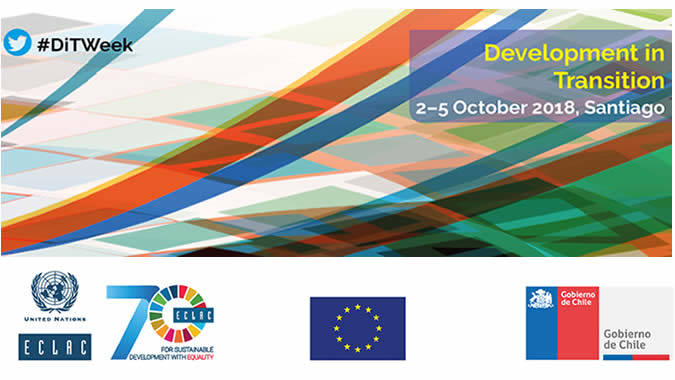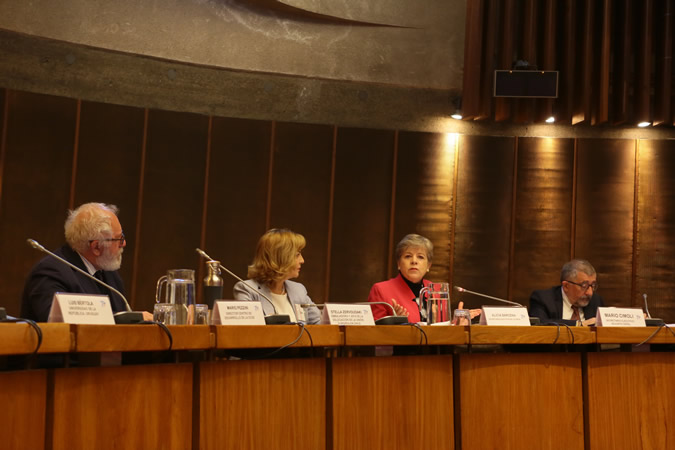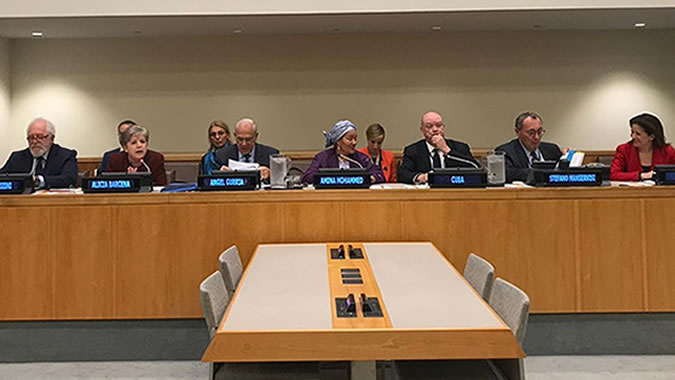International Cooperation Must Change its Approach to Respond to Latin America and the Caribbean’s Own Needs
Work area(s)
The Eighth Meeting of the Presiding Officers of the Committee on South-South Cooperation, a subsidiary body of ECLAC, was held today in Santiago, Chile.

International development cooperation must change and move from the traditional approach to one that responds to the particular needs of Latin America and the Caribbean, senior government authorities from various countries in the region and United Nations officials indicated today during the Eighth Meeting of the Presiding Officers of the Committee on South-South Cooperation, which took place at the organization’s headquarters in Santiago, Chile.
The meeting – carried out in the framework of “Development in transition week,” which runs from October 2 to 5 – was inaugurated by the Executive Secretary of the Economic Commission for Latin America and the Caribbean (ECLAC), Alicia Bárcena, and the Deputy Minister of Foreign Trade and Foreign Investment of Cuba, Ileana Núñez Mordoche, in her capacity as President of the Presiding Officers.
“We are living through a complex time on a global level. For that reason, today more than ever it is urgent that international development cooperation evolve to incorporate the new economic, social and environmental challenges posed by today’s world,” Alicia Bárcena said in her welcome remarks to the authorities in attendance.
The senior United Nations official stressed the need to adapt development cooperation from its current schemes (triangular cooperation, bilateral, multilateral and others) toward an approach that reflects global and local challenges, while also reorienting it toward development in transition with the aim of attaining long-awaited growth and sustainable development.
Meanwhile, Deputy Minister Ileana Núñez Mordoche underscored that today the priorities of international cooperation must be to support the progress of Latin America and the Caribbean toward the implementation of the 2030 Agenda and its Sustainable Development Goals (SDGs), in order to “leave no one behind.”
“Moving toward sustainable development will not be possible without real commitments that include all of the countries of our region, identifying our potentialities and necessities in accordance with the realities faced by each one of our countries,” the Cuban deputy minister indicated.
At the Eighth Meeting of the Presiding Officers of the Committee on South-South Cooperation, special emphasis was given to the challenges faced by the Caribbean, a region that has suffered a series of both economic and environmental vulnerabilities. “After holding our 37th session in Cuba last May, we at ECLAC have underlined as a central element of our work that the Caribbean must come first,” Alicia Bárcena said.
Deputy Minister Núñez Mordoche highlighted the importance of the meeting agenda giving special consideration to this issue, since “it is necessary to prioritize the Caribbean, strengthening its capacities to overcome the vulnerabilities that affect it.”
Along with ECLAC’s Executive Secretary and the Deputy Minister of Foreign Trade and Foreign Investment of Cuba, additional participants in the meeting included Inocencio García, Deputy Minister of International Cooperation at the Ministry of Economy, Planning and Development of the Dominican Republic; Anthony Liverpool, Permanent Secretary of the Ministry of Foreign Affairs, International Trade and Immigration of Antigua and Barbuda; Noel González, Director-General of Planning and Policies for International Development Cooperation at the Mexican Agency for International Development Cooperation (AMEXCID); and Ana Ciuti, Director-General for International Cooperation at the Ministry of Foreign Affairs and Worship of Argentina, among other authorities, government officials and ambassadors.
The attendees also discussed the region’s contributions ahead of the Second High-level UN Conference on South-South Cooperation, which will take place in March 2019 in Buenos Aires, Argentina, and which is being held 40 years after the approval of the Buenos Aires Plan of Action for Promoting and Implementing Technical Cooperation among Developing Countries (BAPA+40).
“We need a change in the narrative on cooperation matters,” Alicia Bárcena emphasized. “We have begun a process to change the conversation between those providing and those receiving cooperation,” she said in reference to the agreement for facilitation of the development of countries in transition, signed a few months ago by ECLAC, the European Union and the Organization for Economic Cooperation and Development (OECD). “With this alliance, we propose a great leap forward in traditional development cooperation,” she stated.
In the final resolutions of this eighth meeting, the delegates agreed to convene an interactive regional dialogue about the region’s priorities – in compliance with resolution 730(XXXVII) of ECLAC’s 37th session – at United Nations Headquarters in New York on November 29-30, 2018, with a view to the Second High-level Conference BAPA+40, which will be held on March 20-22, 2019 in Buenos Aires.
Furthermore, they agreed to foster the coordinated participation of the South-South cooperation mechanisms of Latin America and the Caribbean in the project Network for the Implementation of the 2030 Agenda and Follow-up to the SDGs in the region.
The Committee on South-South Cooperation is a subsidiary body of ECLAC. One of its main objectives is to strengthen international development cooperation activities, including South-South, North-South, triangular and multilateral cooperation.
Related content
Eighth meeting of the Presiding Officers of the Committee on South-South Cooperation
The eighth meeting of the Presiding Officers of the Committee on South-South Cooperation of Latin America and the Caribbean was held at ECLAC headquarters in Santiago

ECLAC, the European Union and the Government of Chile Organize a Week Dedicated to “Development in Transition”
On Thursday, October 4, a high-level dialogue will take place with keynote addresses by Alicia Bárcena, Executive Secretary of the UN regional organization; Neven Mimica, EU Commissioner for…

It is Necessary to Rethink the Concept of Development in Light of International Cooperation, Experts Gathered at ECLAC Sustained
Alicia Bárcena, Executive Secretary of the United Nations regional organization, and Stella Zervoudaki, Ambassador and Head of the European Union Delegation in Chile, inaugurated the seminar that…

International Cooperation Requires a New Narrative that Fully Includes Middle-Income Countries in Order to Achieve the 2030 Agenda
In the framework of the United Nations General Assembly that is taking place in New York, ECLAC’s Executive Secretary, Alicia Bárcena; the European Commission’s Director-General for International…
Type
Country(ies)
Related link(s)
Contact
Public Information Unit
- prensa@cepal.org
- (56 2) 2210 2040
